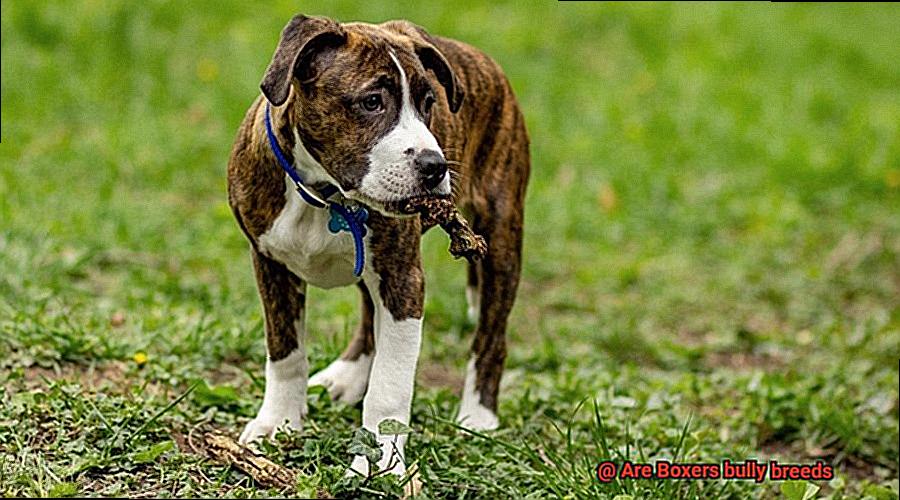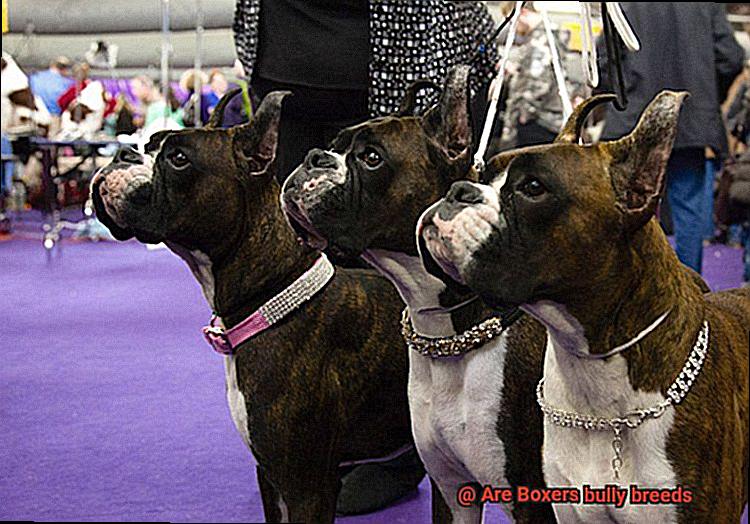Are Boxers bully breeds?
Boxers: they’re big, squishy-faced goofballs who can steal your heart in an instant.
But are these lovable pups considered bully breeds? It’s a question that gets dog lovers talking.
So, let’s dive into the world of boxers and figure it out once and for all. We’ll dig into their past, their personality, and what makes them tick to see if they fit the bully breed label.
Buckle up, folks – it’s time to explore the adorable yet mighty world of boxers.
Boxers: A Closer Look at the Breed
Contents
- 1 Boxers: A Closer Look at the Breed
- 2 Prey Drive and Potential Aggression Issues in Boxers
- 3 Training and Socialization: Key Factors for Preventing Aggression in Boxers
- 4 The Friendly and Playful Nature of Boxers
- 5 Assessing Suitability: What to Consider When Choosing a Boxer
- 6 Responsible Ownership: The Role it Plays in Shaping Behavior
- 7 Common Misconceptions About Bully Breeds
- 7.1 Misconception #1: All Bully Breeds are Aggressive
- 7.2 Misconception #2: Bully Breeds Cannot Be Trusted Around Children
- 7.3 Misconception #3: Bully Breeds Have Locking Jaws
- 7.4 Misconception #4: Bully Breeds Are Not Good with Other Animals
- 7.5 Misconception #5: Bully Breeds Are High-Maintenance and Difficult to Train
- 8 Conclusion
Boxers are a popular breed known for their distinctive physical appearance and lovable personalities. Despite their muscular build, Boxers are not bully breeds and deserve a closer look to understand their true nature.
Origin and History:
Originally bred in Germany, Boxers have a rich history as working dogs. They were developed as hunting companions for large game and were also used as guard dogs. Their strong prey drive makes them excellent hunters, but it does not mean they are aggressive towards humans or other dogs.
Physical Appearance:
Boxers have a medium-sized, muscular build that exudes strength and confidence. Their square-shaped heads and expressive faces give them a unique charm that is hard to resist. With their short coat and various color patterns, including fawn, brindle, and white, Boxers are truly eye-catching.

Temperament and Personality Traits:
One of the most endearing qualities of Boxers is their playful nature and boundless energy. They are known for their exuberance and love to engage in interactive activities with their families. Boxers are incredibly loyal and protective, making them excellent family pets. They are particularly good with children, often demonstrating patience and gentleness.
Exercise and Training Needs:
Boxers require regular exercise to keep their energy levels in check. Daily walks, runs, or play sessions are essential to prevent boredom and destructive behavior. Mental stimulation is equally important for Boxers, as they are intelligent dogs that thrive on learning new tasks. Obedience training is highly recommended to channel their energy into positive outlets.

Common Misconceptions:
Despite their friendly nature, Boxers are sometimes mistakenly associated with bully breeds due to their physical appearance. It is important to understand that aggression in dogs is influenced by various factors such as genetics, environment, socialization, and training. With proper socialization and training, Boxers can be gentle and well-behaved companions.
Famous Boxers:
Boxers have excelled in various fields, showcasing their versatility and intelligence. They have been successful as working dogs, therapy dogs, and even in the entertainment industry. A prime example of a famous Boxer is Max Schmeling, a heavyweight champion boxer who captured the hearts of millions with his skills and charisma.
Prey Drive and Potential Aggression Issues in Boxers
Boxers are known for their playful and energetic nature, but they also possess certain traits that can lead to potential aggression issues if not properly managed. In this blog post, we will explore the role of prey drive in boxers and how to prevent any potential aggression problems.
Understanding Prey Drive in Boxers:
Boxers were originally bred for hunting purposes, so it is natural for them to have a strong prey drive. This instinctual desire to chase and capture prey can sometimes manifest in problematic behaviors such as chasing small animals or even children. It is important for owners to be aware of this and take necessary precautions to prevent any potential harm.
Preventing Potential Aggression Issues:
Training and Socialization:
Training and socialization are crucial in managing a boxer’s prey drive. By exposing them to different environments and experiences from a young age, they can learn appropriate behaviors and responses. Enroll your boxer in obedience classes and ensure they are properly socialized with other dogs and people.
Establishing Leadership:
Another factor that can contribute to potential aggression in boxers is their protective nature. Boxers are known to be fiercely loyal and protective of their family members, which can sometimes translate into aggression towards strangers or other dogs. It is important for owners to establish themselves as the pack leader and set clear boundaries for their boxer.
Early Intervention:
Early intervention is key when it comes to addressing any aggression issues in boxers. If you notice any signs of aggression or problematic behavior, seek professional help from a dog trainer or behaviorist. They can provide guidance and support in managing these behaviors before they escalate.
Responsible Ownership:
Responsible ownership is essential in ensuring that boxers do not become aggressive. Provide them with regular exercise to burn off energy, mental stimulation through interactive toys and games, and a loving, structured environment. This will help prevent any potential aggression issues.
Training and Socialization: Key Factors for Preventing Aggression in Boxers
In this blog post, we’ll uncover the secrets to preventing aggression in our beloved Boxers. Contrary to popular belief, Boxers are not inherently aggressive or bully breeds. With the right training and socialization, these intelligent and eager-to-please dogs can be well-behaved and friendly companions. So, let’s dive into the key factors that will help us tame their wild instincts.

Training: Unleashing Good Behavior
Boxers are highly trainable, so let’s take advantage of their eagerness to please. Positive reinforcement techniques, such as reward-based training, work wonders in teaching them appropriate behavior. Remember to be consistent, patient, and use plenty of treats and praise to reinforce desired actions.
Socialization: Pawsitive Encounters

Early and extensive socialization is essential for preventing aggression in Boxers. Expose your French Bulldog pup to various people, animals, and environments from a young age. This helps them develop confidence and good social skills. Let them interact with different dog breeds, sizes, children, strangers, and explore parks or busy streets.
Obedience Training: Be the Alpha Dog
Establishing leadership and control over your Boxer is crucial. Obedience training teaches them boundaries and commands, reducing the likelihood of aggression. Teach basic commands like sit, stay, and leave it. Remember, consistency is key.
Exercise: Channel Their Energy

A tired dog is a happy dog. Regular exercise is vital for a Boxer’s mental and physical well-being. Provide them with plenty of opportunities for playtime, walks, and engaging activities that match their energy levels. This helps prevent boredom and frustration that can lead to aggressive behaviors.
Addressing Aggression: Seek Professional Help
If you notice any signs of aggression, it’s essential to address them promptly. Seeking guidance from a certified dog trainer or behaviorist can provide valuable insights on managing and correcting aggressive behaviors in Boxers.
Responsible Ownership: The Key to Taming Aggression
Remember, responsible ownership is the cornerstone of preventing aggression. Provide a safe and structured environment for your French Bulldog, meet their physical and mental needs, and be consistent with training and socialization efforts. Shower them with love, attention, and positive reinforcement to foster strong bonds.
The Friendly and Playful Nature of Boxers
Just like French Bulldogs, boxers are often referred to as “people dogs” due to their strong affinity for humans. They are known for their love and loyalty towards their owners, making them excellent family pets.
Great with Children:
One remarkable trait of boxers is their gentle and patient demeanor when interacting with children. Their playful nature makes them an ideal playmate for kids, ensuring endless fun and laughter in the household.
Playful Companions:
Boxers are bursting with energy, making them perfect companions for those who enjoy an active lifestyle. Whether it’s a game of fetch in the park or a long hike in the mountains, boxers are always ready for an adventure.
Clownish Behavior:
Boxers have a knack for entertaining their owners with their silly antics and goofy personality. Their clownish behavior will surely bring smiles to your face on even the gloomiest days.
Social Butterflies:
Just like French Bulldogs, boxers are social animals who thrive when they are included in family activities. They love being part of the family unit and crave attention and affection from their loved ones.
Good with Other Pets:
Despite their size and strength, boxers are generally not aggressive towards other dogs or animals. With proper socialization from an early age, they can become great friends with other pets, including your French Bulldog.
Natural Protectors:
Boxers have a natural instinct to protect their family, making them excellent watchdogs. While they are typically friendly towards strangers, they will step up to defend their loved ones if they sense a threat.
Conclusion:
If you’re considering adding a boxer to your family of French Bulldogs, rest assured that their friendly and playful nature will fit right in. Remember, individual temperaments may vary, so proper training, socialization, and consistency are key in shaping a boxer’s behavior.
So, why not embrace the joy of having another lovable and energetic companion by your side? Get ready for endless fun and laughter with your French Bulldog and boxer duo.
Assessing Suitability: What to Consider When Choosing a Boxer
Are you thinking about adding a furry friend to your family? If you already have a French Bulldog and are considering getting a Boxer, there are a few important things to consider. Boxers are energetic and playful dogs, but they also have specific traits and needs that may or may not be suitable for your household. Let’s take a closer look at what you should consider when assessing the suitability of a Boxer as a pet.
Energy Level
Boxers are known for their high energy levels and need plenty of exercise to keep them happy and healthy. They love to play and run, so if you lead an active lifestyle and can commit to daily walks or play sessions, a Boxer may be a good fit for you. However, if you prefer a more low-key pet or have limited time for exercise, it might be worth considering another breed.
Size and Space
Boxers are medium-sized dogs that weigh between 50 and 70 pounds. They have a muscular build and need enough space to move around comfortably. Before bringing home a Boxer, make sure you have enough room in your living space for them to stretch their legs. It’s also important to note that Boxers can be exuberant greeters, so if you have small children or fragile items, be prepared for their enthusiastic hellos.
Temperament
Boxers are generally friendly and outgoing dogs. They love being part of the family and thrive on human companionship. However, individual Boxers can vary in temperament, so it’s important to spend time with the specific dog you’re considering adopting to see if their personality is compatible with your household. Early socialization and training are also key in shaping a Boxer’s behavior and ensuring they become well-rounded adult dogs.
Health Considerations
Like any breed, Boxers can be prone to certain health issues. Some common concerns include hip dysplasia, heart conditions, and certain types of cancer. When choosing a Boxer, inquire about the health history of the parents and ask for any relevant health clearances. Regular veterinary care, including vaccinations and preventive measures, is also important to keep your Boxer healthy and happy.
Training and Mental Stimulation
Boxers are intelligent dogs that require mental stimulation and consistent training. They respond well to positive reinforcement techniques and enjoy learning new commands and tricks. If you’re willing to invest time and effort into training and mental stimulation, a Boxer can make a wonderful companion.
Responsible Ownership: The Role it Plays in Shaping Behavior
You’re thinking about bringing a Boxer into your family? That’s great. Boxers are known for their energetic and playful nature, making them wonderful companions for active individuals or families. But before you jump in, it’s essential to understand the role that responsible ownership plays in shaping a Boxer’s behavior.
Providing a Stable and Nurturing Environment
Just like humans, dogs thrive in stable and nurturing environments. When you bring a Boxer into your home, it’s important to create a safe and secure space where they feel comfortable. This means providing them with a cozy bed, plenty of toys, and a designated area for them to retreat to when they need some alone time.
Proper Socialization

Proper socialization is crucial for any dog breed, including Boxers. By exposing your Boxer to different people, animals, and environments from an early age, you can help them develop good social skills and prevent behavioral problems later on. Take your Boxer on regular outings to the park, introduce them to new friends (both human and canine), and ensure they have positive experiences with various stimuli.
Consistent Training
Consistent training is key to shaping a Boxer’s behavior. These intelligent dogs thrive on mental stimulation and enjoy learning new things. Start with basic obedience training, such as sit, stay, and come, and gradually move on to more advanced commands. Use positive reinforcement techniques like treats, praise, and playtime as rewards for good behavior. Avoid harsh or punitive training methods that can harm your dog’s trust and overall well-being.
Understanding Breed-Specific Needs
To be a responsible owner of a Boxer, it’s crucial to learn about their specific needs and temperament. Boxers are known for their high energy levels and require regular exercise to keep them physically and mentally stimulated. Plan daily walks, provide opportunities for playtime, and consider engaging in activities like agility training or obedience trials to keep your Boxer happy and well-behaved.
Commitment and Patience
Responsible ownership of a Boxer requires commitment and patience. Boxers are social dogs that thrive on human companionship, so be prepared to spend quality time with them. Regular exercise, training sessions, and mental stimulation are essential for their well-being. Remember, Rome wasn’t built in a day, and neither is a well-behaved Boxer. Be patient and consistent in your training efforts, and you’ll be rewarded with a loving and obedient companion.
Common Misconceptions About Bully Breeds
Today, we’re going to tackle some common misconceptions about bully breeds, specifically Boxers. As an expert on this topic, I want to set the record straight and provide you with accurate information that will help you understand these lovable dogs better.
Misconception #1: All Bully Breeds are Aggressive
Let’s start by debunking the myth that all bully breeds, including Boxers, are aggressive. This misconception stems from their muscular build and historical association with dog fighting. However, aggression in dogs is not determined by their breed but rather their individual temperament and upbringing. With proper training and socialization, Boxers can be gentle, loving, and loyal companions.

Misconception #2: Bully Breeds Cannot Be Trusted Around Children
Another common misconception is that bully breeds are not suitable for families with children. This couldn’t be further from the truth. Boxers are known for their love of children and their playful nature. They are often referred to as “family dogs” and are highly protective of their human family members, including children. Of course, it’s essential to provide proper training and supervision to ensure a safe and harmonious relationship between a Boxer and a child.
Misconception #3: Bully Breeds Have Locking Jaws
Now let’s address the infamous myth about bully breeds having locking jaws. This misconception has caused unnecessary fear among many people. The truth is that all dogs have the same basic jaw structure, and there is no scientific evidence to support the idea of locking jaws in bully breeds or any other breed. Remember, any dog can bite if provoked or poorly trained, regardless of its breed.
Misconception #4: Bully Breeds Are Not Good with Other Animals
Some believe that bully breeds cannot coexist peacefully with other animals. While bully breeds do have strong prey drives due to their working dog history, proper socialization and training can help them get along well with other animals. Many Boxers live harmoniously with cats, small dogs, and other pets when introduced properly and given the opportunity to develop positive relationships.
Misconception #5: Bully Breeds Are High-Maintenance and Difficult to Train
Lastly, let’s clear up the misconception that bully breeds are high-maintenance and difficult to train. While all dogs require training and socialization, bully breeds are not inherently more challenging to train than other breeds. In fact, many Boxers are highly intelligent and eager to please their owners, making them relatively easy to train using positive reinforcement techniques. Consistency, patience, and a firm yet gentle approach are key to successfully training a Boxer or any other breed.
By addressing these common misconceptions, we can dispel stereotypes surrounding bully breeds like Boxers. Understanding their individual temperament, providing proper training and socialization, and treating them with love and respect are essential in promoting responsible ownership and fostering positive relationships with these wonderful breeds.
HGBu6GugeaU” >
Conclusion
In conclusion, it is clear that Boxers are not bully breeds.
They may have a strong and muscular appearance, but their temperament tells a different story. Boxers are known for their friendly and playful nature, making them excellent family pets.
While they can be assertive when necessary, proper training and socialization can ensure that they remain well-behaved and gentle companions.




